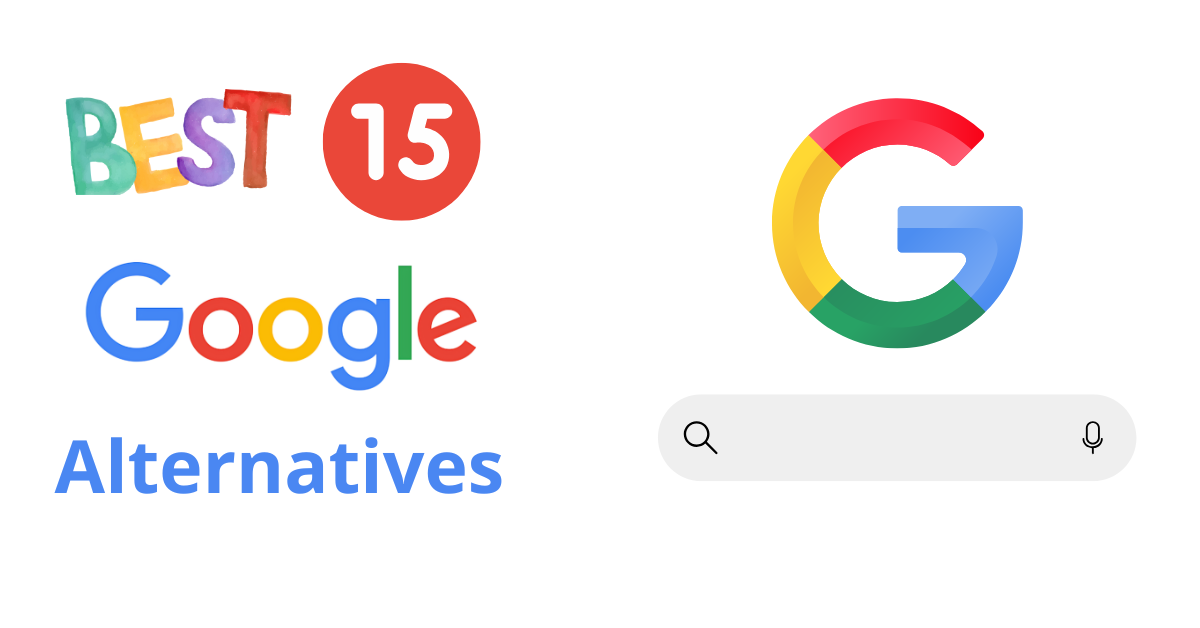
When we talk about search engines, Google has long been the dominant player. But did you know there are other search engines that might serve your needs even better? In 2025, the world of search engines offers a variety of alternatives, each catering to specific preferences—whether you prioritize privacy, eco-friendliness, or a unique browsing experience. Let’s explore the best 15 Google alternatives, detailing their features, strengths, and who they are best suited for.
Introduction To Google
Google has been the undisputed leader in the world of search engines for decades. Since its launch in 1998, it has grown into a massive platform that handles billions of search queries daily. Its clean interface, fast results, and ability to find the most relevant information have made it a household name. Over the years, Google has evolved to offer more than just search—providing services like Google Maps, Gmail, YouTube, and Google Drive.
Why Google Dominates The Market?
Google’s market dominance is not accidental; it’s the result of carefully crafted strategies and innovative technologies that cater to user needs. Here are the reasons for its unmatched position:
- Accurate Results: Its algorithms are designed to deliver the most relevant answers to users’ queries. Google’s AI-powered tools like RankBrain and BERT make search results smarter and more intuitive.
- User-Friendly Design: Google’s simple homepage makes it easy for anyone to use.
- Additional Services: Integration with products like Google Calendar, Translate, Google Maps, Google Photos, YouTube and Workspace keeps users within its ecosystem.
- Constant Innovation: Features like voice search, AI-driven results, and smart suggestions keep Google ahead of the competition.
- Speed and Efficiency: Google is known for its lightning-fast results. Its infrastructure is optimized to process billions of queries in milliseconds, ensuring users get their answers almost instantly.
- Comprehensive Search Results: Google does not just provide web links. It offers a variety of content formats, like Rich Snippets, Knowledge Panels, Multimedia Results
- Global Reach: Google operates in almost every country and supports over 100 languages. Its localization capabilities ensure users worldwide can access results tailored to their region.
- Mobile Optimization: With the rise of mobile internet usage, Google has heavily optimized its search engine for mobile devices, ensuring fast-loading results on smartphones and tablets.
- Personalization: By analyzing users’ search history and preferences, Google delivers personalized search results. For example: Predictive search suggestions in the search bar or customized news and content based on browsing patterns.
- Voice and Visual Search: With tools like Google Assistant and Google Lens, users can search using voice commands or images, making the search experience more accessible and versatile.
- Free Access: Despite its vast resources and advanced capabilities, Google remains free to use for individuals. This accessibility ensures that users of all demographics continue to rely on it.
- Scalability and Continuous Growth: Google continuously invests in scaling its infrastructure and exploring new areas of innovation, ensuring it stays ahead of emerging trends and competitors.
- Marketing and Branding: Google’s consistent branding, coupled with widespread marketing campaigns, has ensured that it remains top of mind whenever someone thinks of online search.
What Are The Concerns With Google?
While Google’s efficiency is undeniable, its widespread use has raised concerns about:
- Privacy: Google tracks users’ data to personalize ads and improve services, which many people find invasive.
- Monopoly: As a dominant player, Google’s control over search results has sparked debates about fairness and competition.
- Ad Saturation: Paid ads often take up the top spots in search results, which can frustrate users.
- Algorithm Transparency: Google’s search algorithms are proprietary and lack transparency, making it difficult to understand how rankings are determined and whether biases exist.
- Third-Party App Access: Google’s policies on sharing data with third-party apps have drawn criticism for potentially exposing users to privacy risks.
- Dependency: The extensive integration of Google products into daily life has created a reliance on its ecosystem, leaving users with fewer alternatives.
Why Look For Google Alternatives?
While Google is a powerful and widely used search engine, it is not always the best fit for everyone. Different users have different priorities, and for some, Google’s features might not align with their needs. Whether it is privacy concerns, ad-heavy results, or the desire for a unique browsing experience, there are plenty of reasons to explore alternatives.
1. Privacy Concerns
Google collects extensive data from its users, including search history, location, and browsing habits. While this helps deliver personalized results and ads, many people are uncomfortable with the amount of data being tracked and stored. For those who value their privacy, Google alternatives that do not track or log user information are an attractive option.
2. Ad-Heavy Experience
Google’s reliance on ad revenue often means that sponsored results take up the top spots in search results. This can make it harder to find organic content, especially for users looking for unbiased information. Alternatives like DuckDuckGo provide ad-free or less intrusive experiences.
3. Unique Features
Some search engines offer specialized features that Google does not. For example:
- Ecosia plants trees with its ad revenue, making it an eco-friendly choice.
- WolframAlpha provides data-driven answers and computations for academic or professional use.
- You.com allows users to customize their search results based on trusted sources.
4. Avoiding Monopolization
Google’s dominance in the search engine market has raised concerns about monopolization and its impact on competition. Exploring alternatives not only supports diversity in the market but also helps you discover tools better tailored to your needs.
5. Regional or Language-Specific Searches
If you are looking for content in specific languages or regions, alternatives like Baidu or Yandex are better suited to deliver localized results. These platforms cater to users in China, Russia, and other regions where Google’s capabilities may be limited.
6. Ethical Concerns
For some users, supporting companies with sustainable or ethical business practices is important. Search engines like Ecosia and Swisscows align with these values by focusing on environmental impact and privacy.
Top 15 Google Alternatives
Here are the top 15 Google alternatives offering diverse features, enhanced privacy, and tailored services to meet your search, productivity, and browsing needs:
1. Bing
Bing is a name many people are familiar with, but it often gets overshadowed by Google. However, Microsoft’s search engine has been quietly improving over the years and now offers several features that make it stand out. In 2025, Bing will be more competitive than ever.
What Makes Bing Special?
Bing is known for its visually rich search experience. The homepage often displays stunning background images, making it visually appealing right from the start. But it is not just about looks—Bing offers practical tools that many users love.
Key Features:
- Rewards Program: Bing Rewards is a unique feature that allows users to earn points just by searching. These points can be redeemed for gift cards, donations, or even sweepstakes entries. Imagine getting rewarded for something you do every day!
- Comprehensive Search Results: Bing provides results that are organized into categories, making it easy to find what you are looking for. You get web links, images, videos, news, and even local results all in one place.
- Image and Video Search: Bing’s image search is particularly strong. You can filter images by size, color, and layout. Video previews on Bing are also more interactive, as you can hover over a video to see a snippet without clicking on it.
- Integration with Microsoft Services: If you use Microsoft Office or Outlook, Bing seamlessly connects with these tools, making it a convenient choice for those in the Microsoft ecosystem.
Who Should Use Bing?
Bing is perfect for people who want to move beyond Google but still need a reliable, feature-rich search engine. If you enjoy earning rewards for daily activities or use other Microsoft services, Bing is a natural fit.
Why Bing is Worth a Try?
Despite being around for years, Bing still surprises users who give it a chance. It offers a fresh take on search with a focus on user experience and utility. Whether you are searching for academic content, planning a trip, or simply browsing images, Bing has you covered.
2. Yandex
Yandex is the most popular search engine in Russia, but it is also gaining traction globally. It offers a wide range of services, making it more than just a search engine. Yandex is like Google in that it provides email, cloud storage, maps, and more.
What Makes Yandex Unique?
Yandex is tailored to provide localized results, especially for users in Russia or those looking for content in Russian. However, its tools and features make it a great choice for international users as well.
Key Features:
- Local Relevance: Yandex excels in delivering region-specific results, particularly in Eastern Europe and Central Asia.
- Advanced Visual Search: Yandex’s image and video search options are robust, allowing users to find specific visual content easily.
- Integrated Ecosystem: Yandex offers a suite of services, including Yandex Mail, Yandex Maps, and Yandex Disk (cloud storage), creating a cohesive digital environment.
- AI-Powered Features: Yandex uses machine learning to enhance search results, offering smart suggestions and relevant content.
Who Should Use Yandex?
Yandex is ideal for people connected to Russia or those interested in accessing content from that region. It is also a good choice for users who want an all-in-one platform with tools beyond just search.
Why Yandex is Worth Exploring?
Yandex’s combination of search capabilities and additional services makes it a strong contender in the global market. Whether you are searching for local businesses, planning a trip, or exploring Russian culture, Yandex delivers a seamless experience.
3. Yahoo Search
Yahoo has been around for decades and is still a strong player in the search engine market. Yahoo Search offers a balanced experience, combining traditional search with easy access to news, sports, and financial updates.
Why Choose Yahoo Search?
Yahoo is more than just a search engine; it is a hub for information. While its search capabilities are solid, its integration with other services is what makes it stand out.
Key Features:
- Integrated Content: Yahoo Search links seamlessly with Yahoo’s other services, such as Yahoo Finance, Yahoo News, and Yahoo Mail. This makes it easy to switch between tasks without leaving the platform.
- News and Updates: Yahoo’s homepage is a treasure trove of news and trends, helping you stay updated on current events while searching for specific information.
- Customizable Experience: Yahoo allows users to personalize their homepage with widgets, weather updates, and preferred news topics, creating a tailored browsing experience.
- Strong Local Search: If you are looking for local businesses, restaurants, or events, Yahoo Search provides detailed and accurate results.
Who Should Use Yahoo Search?
Yahoo Search is great for people who like to stay informed. If you appreciate having news and entertainment updates in the same place as your search results, Yahoo is a solid choice.
What Keeps Yahoo Relevant?
Despite being an older name in the search engine world, Yahoo continues to evolve. It caters to users who want a mix of search functionality and easy access to daily updates. If you have not used Yahoo in a while, it might be time to give it another look.
4. Baidu
Baidu is the dominant search engine in China, serving as the go-to platform for Chinese-language content. If you are researching topics related to China or targeting Chinese audiences, Baidu is an essential tool.
What Makes Baidu Different?
Baidu is optimized for the Chinese language and culture, offering results that are highly relevant to users in China. It also provides additional services, such as maps, music, and translation.
Key Features:
- Chinese Localization: Baidu delivers search results tailored to Chinese users, including region-specific content.
- Rich Media Options: The search engine excels in providing video, image, and music results, catering to a wide range of interests.
- Tools and Services: Baidu offers cloud storage, translation services, and a Wikipedia-like platform called Baidu Baike.
Who Should Use Baidu?
If you are looking for information about China, conducting research in Chinese, or targeting a Chinese audience, Baidu is the best option. It is also a useful tool for travelers planning a trip to China.
Why Baidu is Essential for Chinese Content?
Baidu is designed to meet the needs of Chinese users, offering a localized experience that no other search engine can match. For those outside China, it provides a unique window into Chinese culture and information.
5. DuckDuckGo
DuckDuckGo has made a name for itself by offering users something Google does not—complete privacy. If you are tired of feeling like you are being tracked online, DuckDuckGo is a great alternative. This search engine is all about giving users the freedom to browse without leaving a trace.
How DuckDuckGo Protects Your Privacy?
DuckDuckGo takes a strong stance on privacy. Unlike Google, it does not collect or store your personal information. This means you will not see targeted ads based on your searches, and your data will not be sold to third parties.
Key Features:
- No Search History: DuckDuckGo does not keep records of what you search for. Every time you use it, it is like starting fresh.
- Ad-Free Experience: While it does show some ads to keep the service free, these are not tailored to your search history or personal data.
- Bang Shortcuts: One of DuckDuckGo’s unique features is its “bangs.” These are shortcuts that let you search specific websites directly. For example, typing !a followed by your query takes you straight to Amazon’s search results. There are thousands of these shortcuts, saving you time.
- Simple and Clean Interface: The interface is straightforward, with no distractions. It focuses on providing relevant results without clutter.
Who Should Use DuckDuckGo?
DuckDuckGo is ideal for people who value their privacy and want a search engine that does not monitor their activities. It is also a great choice for anyone who wants a simple, no-nonsense browsing experience.
What Sets DuckDuckGo Apart?
In a world where data privacy is a growing concern, DuckDuckGo stands as a rare solution. It is perfect for anyone tired of personalized ads and feeling like their every move online is being tracked. Whether you are casually browsing or doing serious research, DuckDuckGo ensures your searches remain private.
6. Ecosia
Ecosia is not just a search engine; it is a movement. If you are environmentally conscious and want your online activities to make a difference, Ecosia is a fantastic choice. For every search you perform, Ecosia uses its ad revenue to plant trees.
How Ecosia Helps the Environment?
Ecosia’s mission is to combat deforestation and climate change. The company is transparent about its finances, publishing monthly reports to show how the money is spent.
Key Features:
- Tree Planting: Ecosia has planted over 150 million trees in areas affected by deforestation.
- Carbon-Neutral Servers: The energy used to power Ecosia’s servers comes from renewable sources.
- Privacy-Focused: While Ecosia does use ads to generate revenue, it does not sell your data to advertisers.
Who Should Use Ecosia?
Ecosia is perfect for anyone who cares about the environment and wants to contribute to a good cause. It is also a great option for students, professionals, or casual browsers who want to make a positive impact without changing their habits.
Why Ecosia is Worth Supporting?
Every search you make with Ecosia has a real-world impact. It is a simple way to do good while going about your daily routine. Plus, its search results are powered by Bing, so you are not compromising on quality.
7. Brave Search
Brave Search is a relatively new player in the search engine space, but it has already gained a loyal following. Built by the creators of the Brave browser, it focuses on privacy and transparency. Unlike many search engines that rely on Google or Bing for results, Brave Search has its own independent index, giving it a unique edge.
What Makes Brave Search Different?
Brave Search is designed for users who value control over their data. It does not track your searches, and you can even use it without ads if you opt for the premium version.
Key Features:
- Privacy by Default: Brave Search keeps your searches private. It does not track, log, or share your information with third parties.
- Independent Index: Most search engines rely on data from Google or Bing, but Brave has built its own index, ensuring more diverse and unbiased results.
- Ad-Free Option: If you dislike ads, Brave Search offers a subscription that removes them entirely. This makes it ideal for people who want a clean, distraction-free experience.
- Seamless Integration with Brave Browser: If you use the Brave browser, Brave Search integrates perfectly, offering a unified experience.
Who Should Use Brave Search?
Brave Search is great for privacy-conscious users who want something different from mainstream search engines. If you already use the Brave browser, it is a no-brainer to pair it with Brave Search for a fully private online experience.
Why Brave Search is Growing in Popularity?
Brave Search is a breath of fresh air in a world dominated by Google. Its focus on privacy, combined with its independent index, makes it a solid choice for users who want something innovative yet secure.
8. Startpage
Startpage offers the best of both worlds—it gives you Google-quality results without compromising your privacy. Acting as a middleman, it retrieves Google’s results on your behalf, ensuring that Google does not track or store your data.
Why Startpage Stands Out?
For people who love Google’s search results but hate its data collection practices, Startpage is a game-changer. It allows you to use Google indirectly, keeping your identity completely anonymous.
Key Features:
- Anonymous Searches: Startpage ensures that your IP address and personal data are never exposed.
- Google Results: You get the same high-quality results that Google provides, but without being tracked.
- Customizable Interface: Startpage lets you personalize your search experience by choosing themes, layouts, and even region-based results.
- No Targeted Ads: Ads are shown based on your search terms, not your personal browsing history.
Who Should Use Startpage?
If you love Google’s accuracy but value your privacy, Startpage is a perfect fit. It is especially useful for researchers, professionals, and privacy advocates who want the best search results without being profiled.
Why Startpage is Worth Trying?
Startpage bridges the gap between functionality and privacy. It is a simple yet powerful tool that allows you to browse the web freely without worrying about surveillance or data collection.
9. Qwant
Based in France, Qwant is another privacy-first search engine. It aims to provide relevant results without tracking your activity. Qwant’s focus on user privacy and its European roots make it stand out in a crowded market.
Why Qwant is Unique?
Qwant does not use cookies or track users. It also complies with strict European privacy laws, making it one of the most secure options available.
Key Features:
- No Tracking: Qwant does not log your searches or create a profile based on your browsing habits.
- Dedicated Music Search: Qwant has a special section for finding music, allowing you to discover new songs and artists easily.
- Qwant Junior: This is a kid-friendly version of the search engine, providing safe and age-appropriate content.
- Respect for Privacy: As a European company, Qwant adheres to General Data Protection Regulation (GDPR) standards, ensuring top-notch privacy.
Who Should Use Qwant?
Qwant is perfect for European users or anyone who values privacy. Its clean interface and specialized tools, like Qwant Junior, make it a good choice for families as well.
Why Qwant is Worth a Look?
Qwant’s commitment to privacy and its specialized features make it a strong alternative to Google. If you are looking for a search engine that respects your data while providing excellent results, Qwant is a great option.
10. WolframAlpha
WolframAlpha is not your typical search engine. Unlike Google or Bing, it does not aim to scour the web for links. WolframAlpha is a “computational knowledge engine” designed to provide factual answers and data-driven insights. It is ideal for solving problems, doing research, and answering highly specific questions.
How WolframAlpha Works?
WolframAlpha is built on a vast collection of algorithms and data. Rather than directing users to external websites, it processes your query and provides a direct answer based on its own data sets.
Key Features:
- Problem Solving: WolframAlpha is perfect for solving math equations, from simple arithmetic to advanced calculus. It can also help with physics, engineering, and other technical problems.
- Data Analysis: Need statistics or comparisons? WolframAlpha provides detailed, data-driven answers for queries related to population, economics, or historical data.
- Customized Results: Users can get results tailored to their needs, whether it is for academics, business, or personal use.
- Natural Language Understanding: You can ask questions in plain language, and WolframAlpha will interpret your intent and deliver accurate results.
- Pro Version: For users who want more advanced capabilities, the Pro version offers additional features like step-by-step solutions, data downloads, and interactive widgets.
Who Should Use WolframAlpha?
This search engine is ideal for students, researchers, and professionals in technical fields. If you are someone who needs precise answers instead of a list of links, WolframAlpha is a game-changer.
Why WolframAlpha is Unique?
WolframAlpha is not trying to compete with Google—it is built for a completely different purpose. It thrives in areas where other search engines fall short, like complex computations and detailed factual analysis. If you need accurate, reliable information for academic or professional use, WolframAlpha is unmatched.
11. Search Encrypt
Search Encrypt is a search engine designed with security and privacy in mind. It uses advanced encryption to protect your search data, ensuring that your activity remains private and anonymous.
What Makes Search Encrypt Special?
Search Encrypt uses local encryption to keep your searches private. Once you finish your session, your search history is erased automatically.
Key Features:
- Session-Based Search History: Your searches are only stored temporarily and are deleted when your session ends.
- Local Encryption: Protects your search queries using AES-256 encryption, making them unreadable to anyone else.
- Privacy-First Approach: No tracking, profiling, or storing of user data.
- User-Friendly Interface: The interface is clean and simple, making it easy for anyone to use.
Who Should Use Search Encrypt?
If you are concerned about hackers or prying eyes, Search Encrypt is a great option. It is perfect for people who want to ensure that their online activity remains secure.
Why Search Encrypt Deserves Attention?
With its focus on encryption and privacy, Search Encrypt stands out as a robust alternative for secure browsing. It is ideal for professionals, students, or anyone who values their online privacy.
12. You.com
You.com is a relatively new search engine that lets you customize your search experience. It is designed to give users more control, offering a blend of AI-powered search results and personalization.
How You.com Works?
Unlike traditional search engines, You.com allows you to prioritize the sources you trust. You can rank websites, apps, and services, tailoring the results to your preferences.
Key Features:
- Customizable Results: Rank your favorite sources higher so that they appear first in your search results.
- AI-Powered Answers: You.com uses AI to provide direct answers to queries, reducing the need to click on links.
- App Integration: Includes results from integrated apps like Reddit, Stack Overflow, and Twitter.
- Private Browsing Mode: Keeps your searches anonymous if you choose the incognito mode.
Who Should Use You.com?
If you want a search engine that adapts to your preferences and offers an AI-driven experience, You.com is worth trying. It is especially useful for people who rely on specific apps and websites for information.
Why You.com is a Game-Changer?
You.com puts the user in control, which is a refreshing change from the one-size-fits-all approach of traditional search engines. Its focus on customization makes it perfect for anyone who wants to fine-tune their search experience.
13. Swisscows
Swisscows is a search engine based in Switzerland that focuses on privacy and safe content. It is particularly popular among families, as it automatically filters out inappropriate material.
Why Swisscows Stands Out?
Swisscows is powered by its own servers and algorithms, ensuring that no user data is stored. It also uses semantic data recognition to provide highly relevant results.
Key Features:
- Family-Friendly Filters: Swisscows automatically blocks explicit content, making it ideal for children and families.
- Privacy-Focused: No tracking, data collection, or profiling of users.
- Semantic Search: Uses context to deliver better search results based on user intent.
- Based in Switzerland: Swisscows benefits from strong Swiss privacy laws, ensuring top-notch data protection.
Who Should Use Swisscows?
Swisscows is perfect for parents who want a safe browsing environment for their children. It is also great for anyone who values privacy and dislikes being tracked online.
Why Swisscows is Worth Exploring?
Swisscows combines privacy, safety, and intelligence, making it a standout choice for families and privacy-conscious users. If you want a secure and family-friendly search experience, Swisscows is the way to go.
14. Gigablast
Gigablast is an open-source search engine that prioritizes transparency and efficiency. While it may not have the polish of bigger players, it offers unique features for developers and tech enthusiasts.
What Makes Gigablast Unique?
Gigablast is one of the few search engines that is completely open-source. This means anyone can inspect its code and even modify it for their own purposes.
Key Features:
- Transparency: Open-source code allows users to see exactly how Gigablast operates.
- Lightweight and Fast: Designed to be efficient, Gigablast delivers results quickly, even on slower connections.
- Private Search: No user data is stored or tracked.
- Customizable: Developers can tweak the search engine to suit their specific needs.
Who Should Use Gigablast?
Gigablast is ideal for tech-savvy users, developers, and researchers who value transparency and want more control over their search tools.
Why Gigablast is Worth Trying?
For anyone interested in open-source technology, Gigablast is a fascinating option. It offers a level of transparency and customization that is hard to find elsewhere.
15. Mojeek
Mojeek is a fully independent search engine that uses its own index, making it a rare alternative to Google and Bing. It emphasizes neutrality and aims to provide unbiased results.
How Mojeek Stands Apart?
Unlike most search engines that rely on Google or Bing for their data, Mojeek crawls the web independently. This ensures that its results are not influenced by other search giants.
Key Features:
- Independent Index: Mojeek’s results are entirely its own, offering a fresh perspective on web searches.
- Privacy-First: No tracking, profiling, or data collection.
- Unbiased Results: Since it does not depend on ad revenue, Mojeek provides neutral and objective results.
- Global Reach: While based in the UK, Mojeek caters to users worldwide.
Who Should Use Mojeek?
If you are looking for a truly independent search engine that prioritizes neutrality and privacy, Mojeek is a fantastic option.
Why Mojeek is Unique?
Mojeek offers a refreshing alternative to search engines that rely on data monopolies. Its independence makes it a great choice for users who want unbiased and honest search results.
Final Thoughts
The search engine world is much bigger than Google, and 2025 is the perfect time to explore the alternatives. Each search engine on this list offers something unique:
- Bing rewards you for searching.
- Yandex excels in local and visual searches.
- Yahoo Search combines search with news and updates.
- Baidu is the best for Chinese-language content.
- DuckDuckGo ensures your privacy.
- Ecosia plants trees to save the planet.
- Brave Search gives you independent results without tracking.
- Startpage delivers Google’s results while protecting your data.
- Qwant offers privacy-focused browsing with European charm.
- WolframAlpha provides answers, not just links.
- Search Encrypt protects your data with advanced encryption.
- You.com lets you customize your search experience.
- Swisscows is perfect for families and privacy-conscious users.
- Gigablast appeals to developers with its open-source approach.
- Mojeek offers independence and neutrality.
Whether you are looking for better privacy, localized results, or an eco-friendly mission, there is a search engine tailored to your needs. Try them out, and you might discover a new favorite. The internet is vast—why stick to just one search engine? Explore, experiment, and find the one that works best for you!








No Comments